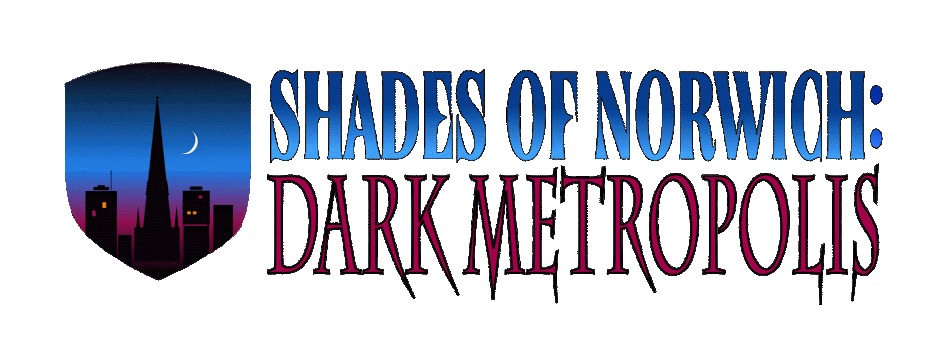The Sanguinarium, known colloquially as the Blood Bank, is a Kindred institution in Norwich. It issues the promise of blood that can be claimed at any time from the bank. The blood bank is kept well stocked by means of a curious ritual known only to the Notary of the city - but rumour has it that select members of the Ordo Dracul are closely involved. This ritual allows a vampire to commit blood to paper, storing it away from decay and transforming the blood into a neutral currency accessible to Kindred of any blood potency. It is also backed up by an extensive feeding ground so even if the bank’s supply of stored blood is cut off for any reason, fresh blood is still available – the red standard, if you will.
These tokens, called blood money or ‘sang’, are a small-change currency, used only when a trivial boon is too much. It may be used to sweeten boon deals or handed out by Elders to tip a neonate for some small favour, but it is extremely rare that any substantial number of these tokens change hands. Rent and fines are the only other places where the tokens are used to any great degree. The other advantage of the currency is that it allows Kindred with extensive feeding grounds and herds, who have more blood than they can personally use, to store it for future use. However, this state is unusual: blood is a limited resource, and if someone is known to have more than they know what to do with, it means they’re keeping it out of the supply that other Kindred use. Also, to some Kindred, assets are more useful when they are...well, liquid.

There are some social associations with blood tokens: flashing blood tokens all over the place as a member of the Low Court can be a little gauche, but it also symbolises how 'in' you are with the High Court and their practices. However, blood tokens won’t impress the High Court and in fact are considered an indication of poverty by the higher ups - if you need to use blood tokens, you can’t feed yourself with fresh blood. It’s an acceptable necessity among younger or low status Kindred, but a Kindred on their way to the top knows that they’re going to have to stop relying on the blood bank and start putting together a portfolio of boons. Hoarding blood tokens is a sign of being insecure in your position or unable to manage your own resources. In addition, those who require blood filled with stimulants or blood from a specific demographic do not find the Blood Bank’s stocks satisfying.
Of course, trading in blood money beyond very small transactions looks suspicious. After all, why would anyone trade in blood when they could trade in boons? A boon is more flexible and is recorded in the books of the Harpies, so they can never be lost or stolen (assuming no fiddling from the Harpies of course, but more than one Harpy has lost their reputation or even life for such fraud in the past.) The other person loses face if they back out on a boon or refuse to pay. And there is always the question: why don’t you want your name in the Harpies’ books? While having blood money isn’t inherently suspicious, relying on it too much is.
Development Notes:
The Blood Bank is an idea we came up with to deal with the problem that there is no 'tipping currency' in Vampire. A trivial boon is actually worth quite a lot, a simple job or a favour, and boons are rarely called in because they were so nebulous (and people forgot they held them). We’ve outlined our Murder of Harpies ideas in this blog, and we are planning on making it easy to register boons and get an update on how many you’re owed and how many you owe, but that still doesn’t solve the problem that boons aren’t ideal as a currency.

Since one of the core concepts of the game is vampiric resource management, we decided to tie the economy into the thing that vampires always need: blood. The problem is, trading blood is messy (and not just in a literal sense). It carries risks of disease, intoxication and addiction – which is intentional, it should be noted, but not conducive to creating an economy. Trading blood directly is still dangerous, but the Blood Bank allows players to ‘cash in’ their capital, i.e. their feeding grounds and herds. It allows Kindred to tot up the costs of a task fairly easily: give me the blood tokens equivalent to what I spent doing this task and one extra, and you’ve got a deal. It also allows rent to become a usable system (otherwise presumably the Regent is just wandering round people’s feeding grounds!) and fines are a much more useful punishment upon Kindred.
There are going to be restrictions: the Blood Bank is not always open for business (so players can’t ‘cash in’ their extra blood at the end of a Court) and it is a social faux pas to rely on the tokens over boons. However, it means that any Kindred who can obtain blood has something to trade with. After all, boons are only as good as the person who owes them, but hard currency is undeniable.
We’re still looking at the economics of the Blood Bank (taking into consideration supply and demand, and where the currency exits the economy, as well as how to keep boons as a still-useful system) but the core concept works with our other ideas of keeping resources limited and making it as easy to trade them as possible.
Thanks to Lucy from Project Praeterlimina for the name for our Blood Bank




No comments:
Post a Comment